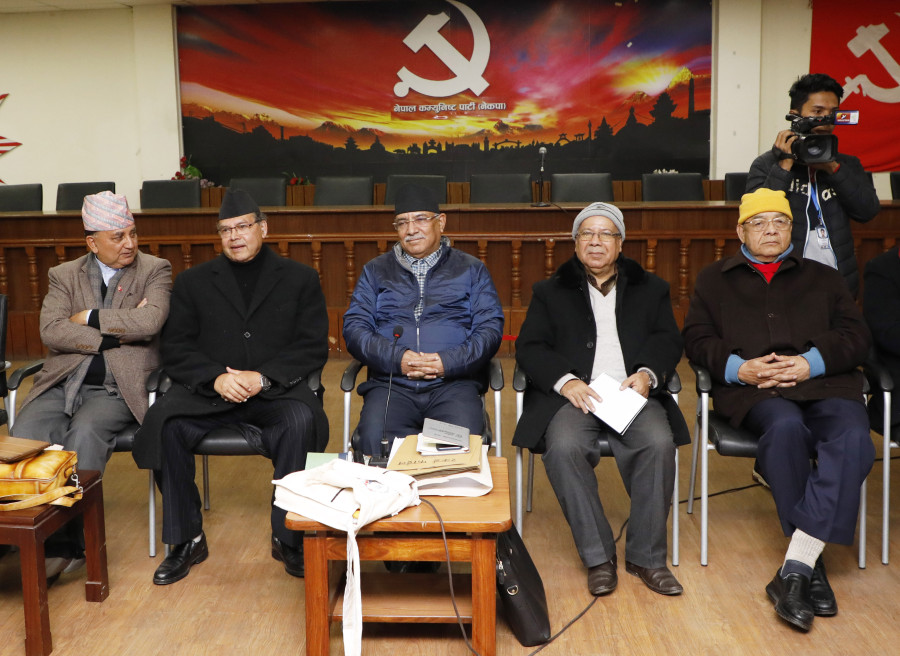National
Ruling party flip-flops after two factions spar over constitution amendment
Divergent narratives in the wake of widespread criticism over the constitution amendment plan are emblematic of Dahal’s increasing hold over the party.
Anil Giri
The Nepal Communist Party’s formation of a three-member task force to amend the constitution to allow a National Assembly member to become prime minister made headlines across the country on Sunday and Monday. But party members say that no such panel has been formed and that the news was selectively leaked to the media by a certain faction within the ruling party.
Two opposing factions belonging to party Chairs KP Sharma Oli and Pushpa Kamal Dahal are divided over the very existence of the task force, once again illustrating the long-running rivalry inside the ruling party between the two chairs. While the Oli camp says that no task force has been formed, the Dahal camp says that the panel was formed under an agreement to keep it under wraps.
Party Chair Pushpa Kamal Dahal, at Saturday’s Secretariat meeting, had proposed the formation of the task force in question. The general understanding among party leaders was that the amendment plan was in favour of Bamdev Gautam, who has long professed his desire to become prime minister.
Some Secretariat members had voiced their concern, as the move could mean changes to the entire governance system, one Secretariat member told the Post on condition of anonymity.
“Members were of the view that the issue should be dealt with carefully,” he said. “Given the chances of possible controversy, even those who are close to Dahal said that more homework was required.”
But there was no deal on forming the panel as such, said the Secretariat member.
Party General Secretary Bishnu Poudel confirmed to the Post that Saturday’s Secretariat meeting had briefly discussed constitution amendment and the formation of the task force, but the issue was not minuted.
“I am the general secretary of the party and if a decision had been taken, it would’ve been minuted,” said Poudel. “No minuting means no panel was formed. It was only discussed.”
However, on Sunday, Dahal announced the names of the three proposed members of the panel—Madhav Kumar Nepal, Subash Nembang and Khimlal Devkota—and called on them to hold a meeting.
At the meeting, Oli, who is also prime minister, flatly rejected amendments to the constitution.
“I cannot be a witness to fulfilling the ambitions of one person,” Oli said, according to the Secretariat member.
But Dahal’s directions had the Oli camp spooked and it leaked information to the media, according to a Central Committee member.
News of the task force was predictably met with fierce criticism, with much of the censure directed at the reasoning behind the decision to amend the constitution—to accommodate one person.
Over the last month or so, Dahal has been steadily tightening his grip over the party. Though empowering Gautam, who has long been demanding a ‘concrete role’, was initially Oli’s predilection, the tables have now turned.
Gautam, who was believed to be Oli’s man, has now switched camps. Dahal now holds considerable sway over the party, with a majority of senior leaders, including Nepal and Jhala Nath Khanal on his side. In the nine-member Secretariat, Dahal now commands a majority.
On Sunday, Nepal, who was supposed to lead the panel, duly called Nembang and Devkota to discuss ways to move forward, a leader close to Nepal told the Post.
“But Nembang outright refused to be a part of the task force, saying he was totally against any bid to amend the constitution for one person,” said the leader.
Nembang told the Post that he was not even aware that such a task force had been constituted.
Nembang shares a close relationship with Oli, who had proposed him for the position of House Speaker. The post eventually went to Agni Sapkota, Dahal’s candidate, a sign of the chair’s changing fortunes in the ruling party.
Devkota, too, has refused to be a part of the task force.
“I went to Nepal’s residence hoping to hold a discussion on issues related to the country’s governance and electoral systems,” said Devkota. “But when I realised that the amendment would pave the way for a National Assembly member to become the prime minister, I could not agree.”
According to Devkota, the constitution should be amended on the basis of necessity—and with justification—rather than on a whim.
According to party leaders, Gautam is desperate to become prime minister as he is among a few senior leaders who have not become the executive head of the country. But there is widespread opposition to Gautam being made prime minister as he is not a member of the House of Representatives, hence the push for an amendment to the constitution to allow a member of the National Assembly to become prime minister. The move has been widely decried by constitutional experts and party members, even those from the Maoist camp.
“Paving the way for someone to become prime minister should not be an ideological issue for Marxists like us,” said Surendra Karki, a party leader who is also known as Ram Karki. “This is an interest-driven idea and it will severely damage the image of the party.”
The two factions are making attempts to control the narrative ever since the news leak invited much criticism. At a time when the party, and especially Oli, is facing a serious challenge to its image after Gokul Baskota became embroiled in a corruption scandal, the Nepal Communist Party cannot afford any more controversies.
“Any attempt to amend the constitution will lead our party into an abyss,” said central committee member Bishnu Rijal. “Such a move will undermine the system and will be against the people’s mandate.




 9.6°C Kathmandu
9.6°C Kathmandu














